小学英语作业的调查报告
小学英语作业布置调查报告
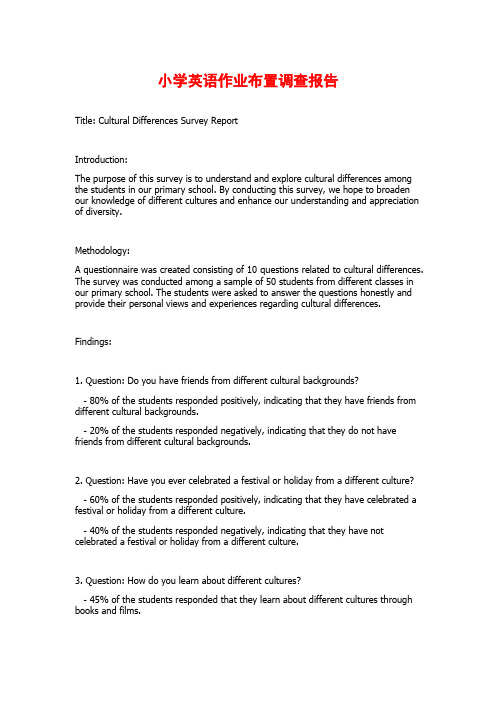
小学英语作业布置调查报告Title: Cultural Differences Survey ReportIntroduction:The purpose of this survey is to understand and explore cultural differences among the students in our primary school. By conducting this survey, we hope to broaden our knowledge of different cultures and enhance our understanding and appreciation of diversity.Methodology:A questionnaire was created consisting of 10 questions related to cultural differences. The survey was conducted among a sample of 50 students from different classes in our primary school. The students were asked to answer the questions honestly and provide their personal views and experiences regarding cultural differences.Findings:1. Question: Do you have friends from different cultural backgrounds?- 80% of the students responded positively, indicating that they have friends from different cultural backgrounds.- 20% of the students responded negatively, indicating that they do not have friends from different cultural backgrounds.2. Question: Have you ever celebrated a festival or holiday from a different culture? - 60% of the students responded positively, indicating that they have celebrated a festival or holiday from a different culture.- 40% of the students responded negatively, indicating that they have not celebrated a festival or holiday from a different culture.3. Question: How do you learn about different cultures?- 45% of the students responded that they learn about different cultures through books and films.- 35% of the students responded that they learn about different cultures through school activities.- 20% of the students responded that they learn about different cultures through travel and personal experiences.4. Question: Do you feel comfortable trying different foods from different cultures? - 75% of the students responded positively, indicating that they feel comfortable trying different foods from different cultures.- 25% of the students responded negatively, indicating that they do not feel comfortable trying different foods from different cultures.5. Question: Do you think it is important to respect other cultures?- 95% of the students responded positively, indicating that they believe it is important to respect other cultures.- 5% of the students responded negatively, indicating that they do not think it is important to respect other cultures.Conclusion:Based on the survey findings, it can be concluded that the majority of the students in our primary school have friends from different cultural backgrounds and believe in the importance of respecting other cultures. However, there is still a portion of students who do not have friends from different cultural backgrounds and may need more exposure to different cultures. It is crucial for our school to promote cultural diversity and provide opportunities for students to learn about and appreciate different cultures through various activities and experiences.。
关于小学英语家庭作业的调查报告(共五则)

关于小学英语家庭作业的调查报告(共五则)第一篇:关于小学英语家庭作业的调查报告关于小学英语家庭作业的调查报告调查时间:2012年12月调查地点:渔歌小学调查对象:3~6年级学生调查方法:问卷调查法调查人员:李红海调查分工:李红海负责以上三项调查一直以来,我校学生英语家庭作业地完成情况不容乐观。
为了使学生能完成英语家庭作业,更有效地掌握英语,提高家庭作业地效率,2012年12月中旬我制定了关于小学英语家庭作业的调查问卷,对我校三至六年级学生进行了家庭作业地调查。
具体如下:一、调查的方式为了使受调查的学生具有普遍性、客观性,增加调查的可信度,我采用无记名全员答卷的方法,并按年级在校门口设立了作业问卷投票箱,以便学生家长自由表达意见。
然后从每位英语教师任课的班级抽取一个,再从这个班随机抽取18份进行问卷调查汇总,然后对试卷中的各个问题逐项按人次作了统计,结果作为本调查报告的依据。
二、调查的内容本次调查共设计了5道题,包括作业量、完成作业时间、态度、作业批阅与反馈评价以及课外阅读、学生的英语学习兴趣等多方面。
具体题目如下:1、你觉得孩子英语家庭作业量如何?()A非常多B.适中C、较少2、学校教师对家庭作业每次都自己批改吗?()A.每次都坚持批改B.偶尔批改C.不批改3、你认为自己的每天的英语家庭作业量多少比较合适?()A、15分钟左右B.30分钟左右C、1小时左右4、你希望的英语家庭作业类型是()A、抄写为主B、课外阅读为主C、听、读为主5、你喜欢英语学科吗?()A.喜欢B.不喜欢C.马马虎虎三、调查数据分析1、在被调查的家长中,有185人认为英语老师布置的作业量适中,占总数的81.14%,有17人认为我校作业量太少,占总数的7.45%,有人认为我校的英语学科作业量太多,占总数的11.41%。
三、四年英语家庭作业量比较合适,有部分家长认为作业不是很多,五、六年级英语家庭作业量大部分家长认为比较适中,个别教师英语家庭作业量较大。
小学英语学习调查报告

小学英语学习调查报告篇一:小学生英语学习情况调查问卷及调查分析报告小学生英语学习情况调查问卷亲爱的同学们:你们好!为了进一步提高同学们的英语水平和教师的教课水平,占用同学们一点宝贵的时间,来帮助完成这份问卷调查,本问卷采取无记名的方式,还望同学们认真填写,谢谢大家的合作!1、你对英语感兴趣吗?()A.特别感兴趣B. 比较感兴趣C.不太感兴趣D.一点也不感兴趣2、你在学习英语时遇到的最大困难是 ()A. 读单词B. 读句子C. 背单词D. 写单词E. 没有3、你每天都朗读英语吗?()A. 是的B. 有时朗读C. 不朗读4、你能认真进行英语书写吗?()A. 能B.有时能C.不能够5、在家里家长能辅导你学英语吗?()A.能B.不能6、在学英语中,你遇到的主要困难是什么?()A.听力B. 口语C.写作D.阅读E.语法7、你讨厌背英文单词吗?()A. 不讨厌B. 背不出,很讨厌C.还可以8、上英语课时,你会忘记带英语书吗?()A.不会B. 有时候会忘C.经常忘9、在学习中,你以什么方式记忆最有效?()A.活学活用B.死记硬背C.只看不写D.只写不看E.多听录音F.边读边写G.其他方式10、现在你学习英语感觉?()A.容易B.难C.不想学问卷到此结束,再次感谢同学们的积极配合!小学英语学习情况调查分析报告这次调查的对象是小学三、四年级学生,共有学生64人,调查了64人,有效62份。
从调查所得的数据看,我校小学三、四年级英语教学呈现以下特点:1、一部分学生养成了良好的英语学习习惯。
学习任何一门学科,都离不开学生积极主动地学习,离不开良好的学习习惯。
从调查的结果看,在小学英语学习上,学生已经具备了学好英语的基本要素。
调查数据如下:从以上数据可以看出,能够坚持每天都朗读英语的有20人,占30%。
从抽样调查看,全班同学大多数都能认真书写英语,这是学习英语的重要态度。
大部分学生都能时刻记着把英语教材和其他教材一起带到学校,这也是英语学习的重要态度。
英语调查报告(优秀8篇)
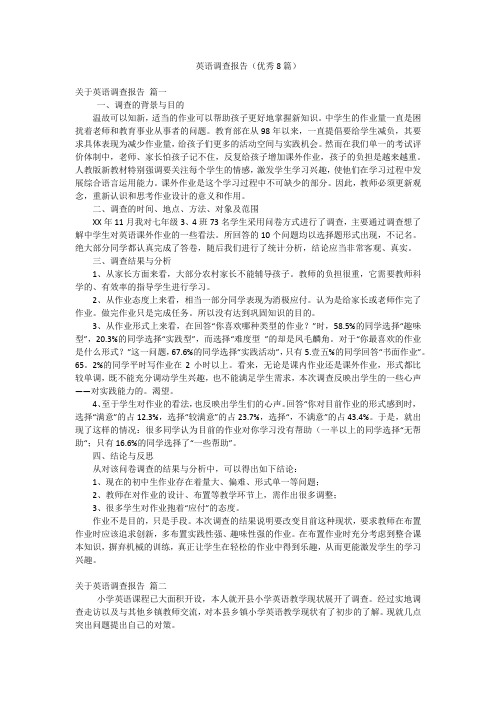
英语调查报告(优秀8篇)关于英语调查报告篇一一、调查的背景与目的温故可以知新,适当的作业可以帮助孩子更好地掌握新知识。
中学生的作业量一直是困扰着老师和教育事业从事者的问题。
教育部在从98年以来,一直提倡要给学生减负,其要求具体表现为减少作业量,给孩子们更多的活动空间与实践机会。
然而在我们单一的考试评价体制中,老师、家长怕孩子记不住,反复给孩子增加课外作业,孩子的负担是越来越重。
人教版新教材特别强调要关注每个学生的情感,激发学生学习兴趣,使他们在学习过程中发展综合语言运用能力。
课外作业是这个学习过程中不可缺少的部分。
因此,教师必须更新观念,重新认识和思考作业设计的意义和作用。
二、调查的时间、地点、方法、对象及范围XX年11月我对七年级3、4班73名学生采用问卷方式进行了调查,主要通过调查想了解中学生对英语课外作业的一些看法。
所回答的10个问题均以选择题形式出现,不记名。
绝大部分同学都认真完成了答卷,随后我们进行了统计分析,结论应当非常客观、真实。
三、调查结果与分析1、从家长方面来看,大部分农村家长不能辅导孩子。
教师的负担很重,它需要教师科学的、有效率的指导学生进行学习。
2、从作业态度上来看,相当一部分同学表现为消极应付。
认为是给家长或老师作完了作业。
做完作业只是完成任务。
所以没有达到巩固知识的目的。
3、从作业形式上来看,在回答“你喜欢哪种类型的作业?”时,58.5%的同学选择“趣味型”,20.3%的同学选择“实践型”,而选择“难度型”的却是凤毛麟角。
对于“你最喜欢的作业是什么形式?”这一问题,67.6%的同学选择“实践活动”,只有5.壹五%的同学回答“书面作业”。
65。
2%的同学平时写作业在2小时以上。
看来,无论是课内作业还是课外作业,形式都比较单调,既不能充分调动学生兴趣,也不能满足学生需求,本次调查反映出学生的一些心声——对实践能力的。
渴望。
4、至于学生对作业的看法,也反映出学生们的心声。
回答“你对目前作业的形式感到时,选择“满意”的占12.3%,选择“较满意”的占23.7%,选择“,不满意”的占43.4%。
我校小学生英语学习兴趣调研报告

小学生英语学习兴趣调研报告我校小学生英语学习兴趣调研报告摘要:瑞士著名教育家皮亚杰说过:“所有智力方面的活动都要依赖于兴趣。
”学生只有对英语有兴趣,才会激发学生学习的积极性,才会激发学生学习英语的动力。
持续的兴趣最终转化为稳定的学习动机。
学生的学习兴趣是学好英语的前提条件和重要保证。
关键字:英语学习, 兴趣一、调查的目的、对象和内容随着经济的全球化,英语的重要性也日益突出。
英语作为一种国际通用语言,占据着相当重要的地位。
因而英语学习是必要的。
同时我国提倡素质教育。
素质教育要求面向全体学生,全面提高学生的素质。
因而要提高学生各方面的能力包括学习英语的能力。
小学生学习英语,最重要的是培养学生学习英语的兴趣。
兴趣是最好的老师,只有学生有兴趣了,才能逐步培养其积极性,从而才能促进学生发展。
为了进一步研究我校学生英语学习兴趣,针对本校我所执教的三个年段(三年级、四年级、六年级)34名学生(20名男生,14名女生)进行了调查与分析,调查内容如下:1、学生英语学习的兴趣如何2、影响学生英语学习兴趣的因素二、调查方法1、访谈法(采用深入的方法访谈不同类的学生)2、实地考察法(在教学中观察学生、研究学生,及时记录学生的学习情况)3、讨论法(与其他教师讨论交流)4、文献资料法(认真学习教育、心理学以及小学英语新课程中有关学习理论,为从事课题研究提供正确可靠的理论依据)5、问卷调查法(通过问卷,调查研究学生的学习兴趣)6、经验总结法(总结研究中的有效经验)三、调查结果(一)、学生学习英语的兴趣现状我校处于比较偏远的山村,英语课程开设的时间并不长。
前几年,学校没有专业的英语教师,英语课程也不能很好地开展,学生对英语课程并不是很感兴趣。
目前,大部分学生对英语感兴趣,只有一小部分的人对英语的兴趣不浓。
我校学生对英语感兴趣,主要是英语课堂带给学生的快乐感以及成就感。
首先,英语课堂的游戏多样化以及朗朗上口的chant,让学生觉得很有意思。
英语学习调查报告范文(3篇)
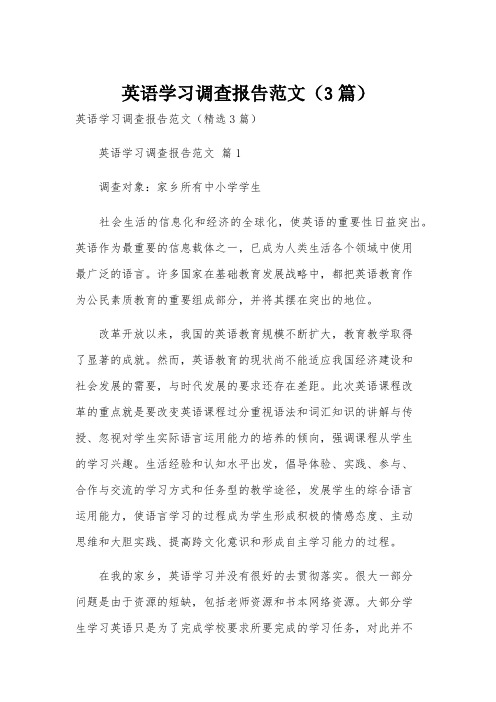
英语学习调查报告范文(3篇)英语学习调查报告范文(精选3篇)英语学习调查报告范文篇1调查对象:家乡所有中小学学生社会生活的信息化和经济的全球化,使英语的重要性日益突出。
英语作为最重要的信息载体之一,已成为人类生活各个领域中使用最广泛的语言。
许多国家在基础教育发展战略中,都把英语教育作为公民素质教育的重要组成部分,并将其摆在突出的地位。
改革开放以来,我国的英语教育规模不断扩大,教育教学取得了显著的成就。
然而,英语教育的现状尚不能适应我国经济建设和社会发展的需要,与时代发展的要求还存在差距。
此次英语课程改革的重点就是要改变英语课程过分重视语法和词汇知识的讲解与传授、忽视对学生实际语言运用能力的培养的倾向,强调课程从学生的学习兴趣。
生活经验和认知水平出发,倡导体验、实践、参与、合作与交流的学习方式和任务型的教学途径,发展学生的综合语言运用能力,使语言学习的过程成为学生形成积极的情感态度、主动思维和大胆实践、提高跨文化意识和形成自主学习能力的过程。
在我的家乡,英语学习并没有很好的去贯彻落实。
很大一部分问题是由于资源的短缺,包括老师资源和书本网络资源。
大部分学生学习英语只是为了完成学校要求所要完成的学习任务,对此并不引起重视,所以学了几年,只会最基本的日常交流,然而这对要学好英语是完全不够的。
多数学生上课时也不怎么认真,考试时也自己蒙混过关,及格了变抛之千里。
对此,我认为应该从以下方面去落实英语的学习。
一、培养兴趣我国古代教育家孔子云:“知之者,不如好之者,好之者,不如乐之者。
”爱因斯坦说:“兴趣是最好的老师”。
学生的学习兴趣是推动学生学习的一种最实际最有效的内部动力,直接影响学习效果和教学成绩。
因此在教学过程中,要让学生轻松、愉悦、主动、有效地学习,关键就是培养起学生的学习兴趣。
几年来,我在教学过实践中围绕这一课题,进行了一些探讨和尝试。
1,情感诱导,调动兴趣著名的外语教育家曾说过:“情感对外语学习的作用至少与认识技能同等重要,甚至更重要。
关于小学英语学习调查报告总结范文7篇
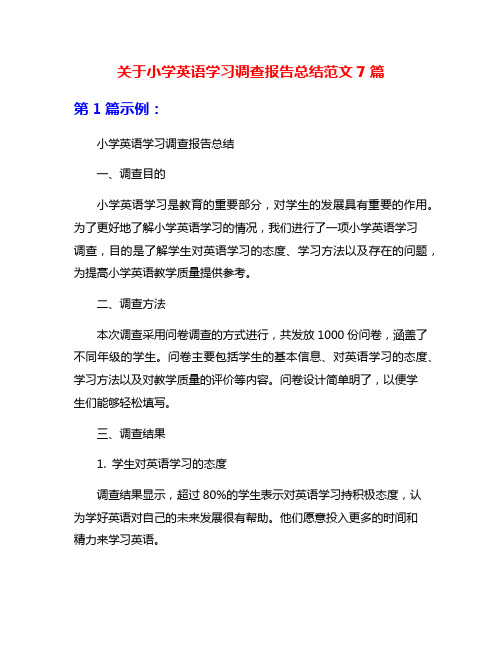
关于小学英语学习调查报告总结范文7篇第1篇示例:小学英语学习调查报告总结一、调查目的小学英语学习是教育的重要部分,对学生的发展具有重要的作用。
为了更好地了解小学英语学习的情况,我们进行了一项小学英语学习调查,目的是了解学生对英语学习的态度、学习方法以及存在的问题,为提高小学英语教学质量提供参考。
二、调查方法本次调查采用问卷调查的方式进行,共发放1000份问卷,涵盖了不同年级的学生。
问卷主要包括学生的基本信息、对英语学习的态度、学习方法以及对教学质量的评价等内容。
问卷设计简单明了,以便学生们能够轻松填写。
三、调查结果1. 学生对英语学习的态度调查结果显示,超过80%的学生表示对英语学习持积极态度,认为学好英语对自己的未来发展很有帮助。
他们愿意投入更多的时间和精力来学习英语。
在学习方法方面,大部分学生表示他们主要通过课堂学习、课外阅读以及英语角等方式来提高英语水平。
同时也有部分学生会利用互联网资源来辅助学习。
3. 教学质量评价在对教学质量的评价方面,大部分学生表示对老师的教学方式和认真程度比较满意。
但也有部分学生认为老师在教学中缺少趣味性,导致学生参与度不高。
通过此次调查,我们了解到学生对英语学习态度良好,大部分学生都认识到了英语学习的重要性。
学生的学习方法多样化,其中也有部分学生倾向于利用互联网资源进行学习。
一些学生在老师的教学方式方面提出了一些建议。
在今后的教学中,我们应该更多地关注学生的需求,注重提升教学的趣味性和互动性。
更多地利用互联网和多媒体资源,丰富教学内容,激发学生学习的兴趣。
也要鼓励学生在课外多进行英语实践,例如阅读英语,参与英语角等活动。
小学英语学习调查结果显示了学生对英语学习的积极态度和多样化的学习方法,同时也提出了对教学质量的一些建议。
通过这些反馈,我们可以更好地指导未来的英语教学工作,为学生的成长和发展提供更好的支持。
第2篇示例:小学英语学习调查报告总结随着国家对英语教育的重视和推动,小学阶段的英语学习也变得日益重要。
小学英语家庭作业情况调查报告范文
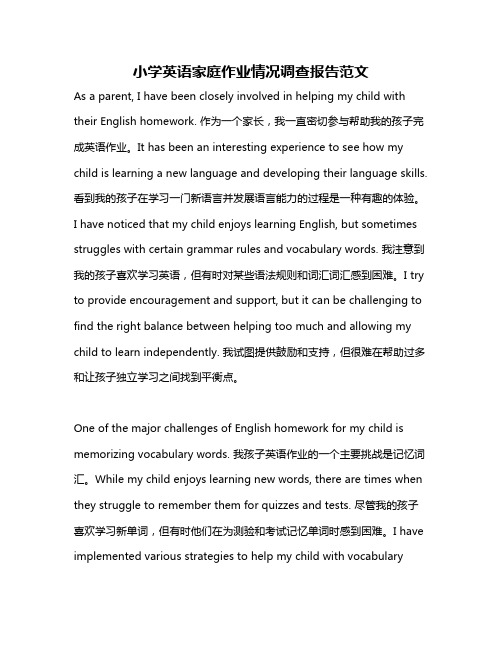
小学英语家庭作业情况调查报告范文As a parent, I have been closely involved in helping my child with their English homework. 作为一个家长,我一直密切参与帮助我的孩子完成英语作业。
It has been an interesting experience to see how my child is learning a new language and developing their language skills. 看到我的孩子在学习一门新语言并发展语言能力的过程是一种有趣的体验。
I have noticed that my child enjoys learning English, but sometimes struggles with certain grammar rules and vocabulary words. 我注意到我的孩子喜欢学习英语,但有时对某些语法规则和词汇词汇感到困难。
I try to provide encouragement and support, but it can be challenging to find the right balance between helping too much and allowing my child to learn independently. 我试图提供鼓励和支持,但很难在帮助过多和让孩子独立学习之间找到平衡点。
One of the major challenges of English homework for my child is memorizing vocabulary words. 我孩子英语作业的一个主要挑战是记忆词汇。
While my child enjoys learning new words, there are times when they struggle to remember them for quizzes and tests. 尽管我的孩子喜欢学习新单词,但有时他们在为测验和考试记忆单词时感到困难。
小学生英语学习情况报告
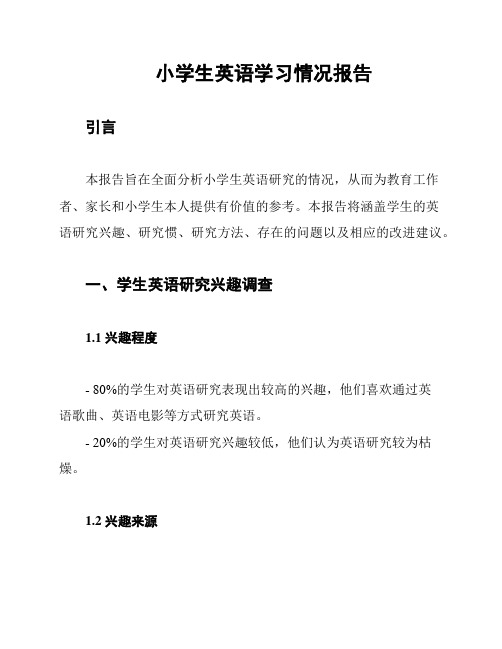
小学生英语学习情况报告引言本报告旨在全面分析小学生英语研究的情况,从而为教育工作者、家长和小学生本人提供有价值的参考。
本报告将涵盖学生的英语研究兴趣、研究惯、研究方法、存在的问题以及相应的改进建议。
一、学生英语研究兴趣调查1.1 兴趣程度- 80%的学生对英语研究表现出较高的兴趣,他们喜欢通过英语歌曲、英语电影等方式研究英语。
- 20%的学生对英语研究兴趣较低,他们认为英语研究较为枯燥。
1.2 兴趣来源- 40%的学生表示,他们对英语研究的兴趣来自于教师的引导和激发。
- 30%的学生表示,他们对英语研究的兴趣来自于家长的鼓励和支持。
- 20%的学生表示,他们对英语研究的兴趣来自于同学之间的互相影响。
- 10%的学生表示,他们对英语研究的兴趣来自于自己对英语国家的文化兴趣。
二、学生英语研究惯调查2.1 研究时间- 80%的学生每天会花费1-2小时进行英语研究。
- 20%的学生每天花费的英语研究时间不足1小时。
2.2 研究方式- 50%的学生表示,他们会按照课程要求进行研究。
- 30%的学生表示,他们会自主查找资料进行研究。
- 20%的学生表示,他们会参加课外辅导班进行研究。
三、学生英语研究方法调查3.1 研究方法- 60%的学生表示,他们会通过背单词、阅读英语文章等方式进行研究。
- 40%的学生表示,他们会通过看英语电影、听英语歌曲等方式进行研究。
3.2 研究效果- 80%的学生认为,他们的研究方法对提高英语成绩有一定的帮助。
- 20%的学生表示,他们的研究方法对提高英语成绩帮助不大。
四、学生英语研究中存在的问题及改进建议4.1 存在的问题- 70%的学生表示,他们在英语研究中存在的最大问题是词汇量不足。
- 20%的学生表示,他们在英语研究中存在的最大问题是语法掌握不扎实。
- 10%的学生表示,他们在英语研究中存在的最大问题是听说能力较弱。
4.2 改进建议- 对于词汇量不足的问题,建议学生增加阅读英语文章、听英语歌曲、看英语电影等,以提高词汇量为目标。
小学英语调查报告7篇
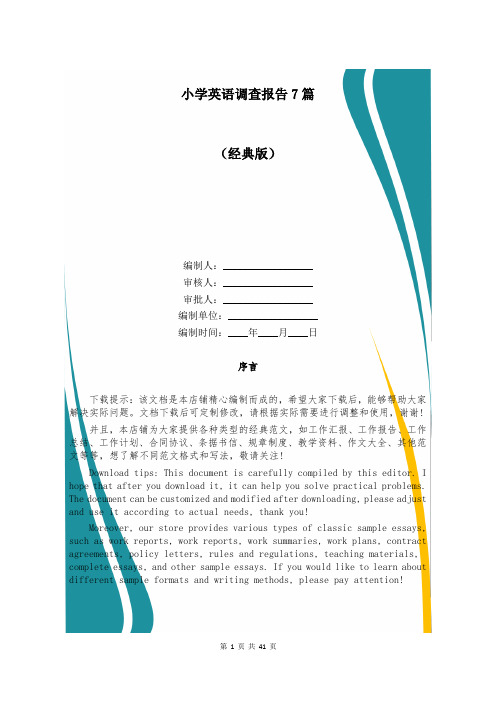
小学英语调查报告7篇(经典版)编制人:__________________审核人:__________________审批人:__________________编制单位:__________________编制时间:____年____月____日序言下载提示:该文档是本店铺精心编制而成的,希望大家下载后,能够帮助大家解决实际问题。
文档下载后可定制修改,请根据实际需要进行调整和使用,谢谢!并且,本店铺为大家提供各种类型的经典范文,如工作汇报、工作报告、工作总结、工作计划、合同协议、条据书信、规章制度、教学资料、作文大全、其他范文等等,想了解不同范文格式和写法,敬请关注!Download tips: This document is carefully compiled by this editor. I hope that after you download it, it can help you solve practical problems. The document can be customized and modified after downloading, please adjust and use it according to actual needs, thank you!Moreover, our store provides various types of classic sample essays, such as work reports, work reports, work summaries, work plans, contract agreements, policy letters, rules and regulations, teaching materials, complete essays, and other sample essays. If you would like to learn about different sample formats and writing methods, please pay attention!小学英语调查报告7篇调查报告的目的是为了为决策者提供有力的支持,以便做出明智的决策,调查报告的目的在于向利益相关者提供一个全面、清晰的了解调查情况的途径,以下是本店铺精心为您推荐的小学英语调查报告7篇,供大家参考。
2024年小学英语备课作业检查总结

2024年小学英语备课作业检查总结____年小学英语备课作业检查总结在____年度的小学英语备课作业检查中,我主要检查了学生的课堂讨论参与度、作业完成情况、口语表达能力以及写作水平。
以下是我的总结:首先,学生的课堂讨论参与度表现出了明显的提高。
他们积极参与课堂讨论,能够用英语发表自己的观点,并与其他同学进行交流。
我注意到他们使用了更多的英语词汇和语法,表达更加流利、准确。
这说明他们已经能够理解并使用学过的英语知识,有较强的口语表达能力。
其次,学生完成作业的情况也有了明显的改善。
他们准时完成了布置的作业,作业质量也有了明显的提高。
他们的作业语法准确,拼写正确,并且对问题的回答清晰明了。
这显示出学生们在家里付出了更多的努力,并且已经形成了良好的学习习惯和自主学习能力。
第三,学生的口语表达能力有了很大的进步。
他们在口语练习中能够流利地用英语交流,并且掌握了一些日常对话的基本句型和常用词汇。
通过模拟真实情境的口语练习,学生们能够更好地运用所学知识,并且具备一定的沟通能力。
同时,我也鼓励学生们多参加口语比赛和演讲活动,以提高他们的口语表达能力。
最后,学生的写作水平也有了显著的提升。
他们能够用简单的英语表达自己的观点和感受,并且在写作中使用了一些句型和词汇。
虽然他们的写作水平还有待进一步提高,但可以看出他们已经掌握了基本的写作技巧,并且在写作中逐渐增加了句子的长度和复杂度。
综上所述,____年小学英语备课作业检查中,学生们在课堂讨论参与度、作业完成情况、口语表达能力和写作水平等方面都取得了明显的进步。
这说明他们在英语学习中付出了努力,并且已经掌握了一定的英语知识和技能。
然而,仍然有一些学生存在一些问题,比如词汇量不够丰富、句子结构不够复杂等。
因此,我会继续鼓励和引导学生们进一步提高自己的英语水平,帮助他们更好地掌握英语知识,提高英语综合能力。
小学英语作业布置调查报告-调查报告

小学英语作业布置调查报告-调查报告新课程下的英语作业定位于课堂的深化,即以任务为中心、以英语语言为载体,体现真实性、生活性、人文性,充分激发学生聪明才智与学习兴趣,在做作业的过程中,综合运用语言,促进学生富有个性、健康有效的发展。
它旨在开发学生潜在的学习能力,为学生开创一个将英语应用于生活实际的广阔天地。
作业是课堂教学的补充和延续,在英语教学中占着举足轻重的地位。
然而,调查发现,我们现在的课外作业还有以下几个共同的特点:一种形式新授结束后,接下来要求学生做的就是拿出抄写本,抄写课文中要求四会掌握的单词、词组或者句子。
久而久之,英语作业不用老师布置,学生会在教师上课之时,小心翼翼的抄好了。
一个目标通过反复抄这些单词和句子,让学生掌握他们的书写形式,能够在听写、测验和考试时应答如流。
一样任务布置给学生的课外作业,每位同学都必须做的,不管什么理由,少抄都视为偷懒行为,多抄则是没听清楚老师的交待。
课外作业的设计存在的问题所带来的负面效应有:缺乏实践性,应用性,创新性和趣味性,内容封闭僵化,远离学生的实际生活。
这不仅降低了学生对英语的兴趣,更严重的是使英语课外作业成了学生的负担。
改进小学英语课外作业迫在眉睫。
改进小学英语课外作业不仅可有效地巩固课堂教学,而且有助于提高学生学习英语的积极性,养成良好的学习习惯。
在深入实施素质教育的今天,面向全体学生,为学生的全面发展和终身发展奠定基础是本次基础教育改革的核心思想。
因此,改进小学英语课外作业布置,促使基础教育改革全方位进行,具有重要的意义。
一、创新作业的原则1.培养学生的学习兴趣和学习自信心小学英语课程的任务之一是激发和培养学生学习英语的兴趣,使学生树立学好英语的自信心。
学生只有对英语及其文化持有积极的情感,才能保持学习英语的动力。
基于以上理念,教师在布置作业时必须考虑作业是否符合学生的年龄特点,学生是否喜欢做和愿意做,学生完成作业后能否体验到成就感,是否对自己的英语学习能力持有自信等。
西安市小学英语作业现状调查报告范文
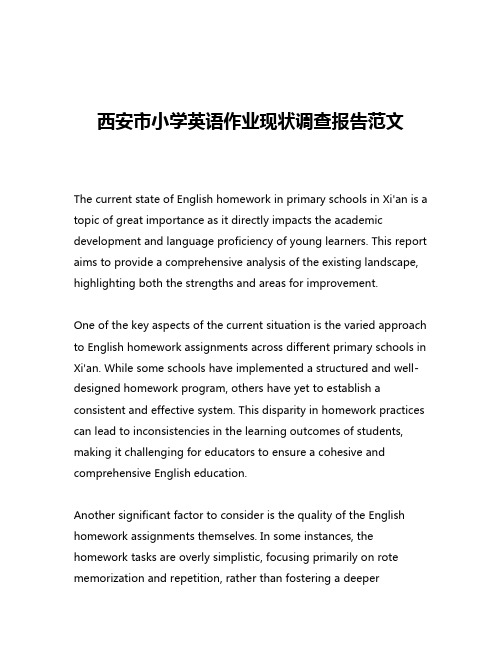
西安市小学英语作业现状调查报告范文The current state of English homework in primary schools in Xi'an is a topic of great importance as it directly impacts the academic development and language proficiency of young learners. This report aims to provide a comprehensive analysis of the existing landscape, highlighting both the strengths and areas for improvement.One of the key aspects of the current situation is the varied approach to English homework assignments across different primary schools in Xi'an. While some schools have implemented a structured and well-designed homework program, others have yet to establish a consistent and effective system. This disparity in homework practices can lead to inconsistencies in the learning outcomes of students, making it challenging for educators to ensure a cohesive and comprehensive English education.Another significant factor to consider is the quality of the English homework assignments themselves. In some instances, the homework tasks are overly simplistic, focusing primarily on rote memorization and repetition, rather than fostering a deeperunderstanding of the language. This approach can be demotivating for students, as it fails to engage them in meaningful learning experiences that would better prepare them for real-world communication and language application.Conversely, there are also examples of primary schools in Xi'an that have incorporated more engaging and interactive homework assignments, which leverage technology, multimedia resources, and collaborative learning activities. These innovative approaches have proven to be effective in enhancing student engagement, promoting critical thinking, and cultivating a genuine interest in the English language.One area of concern is the level of support and guidance provided to students and their families in completing English homework. Some schools have implemented comprehensive support systems, including after-school tutoring, parent-teacher communication, and online resources, to ensure that students receive the necessary assistance and guidance. However, in other instances, the lack of such support systems can lead to frustration and a sense of isolation among students and their families, ultimately hindering the learning process.The role of teachers in shaping the English homework landscape in Xi'an primary schools is also crucial. The quality of teacher training,their pedagogical approaches, and their ability to adapt to the diverse learning needs of students can significantly impact the effectiveness of the homework assignments. Schools that invest in professional development for their English teachers and encourage collaborative lesson planning tend to have more successful homework programs.Furthermore, the alignment between the English homework and the overall curriculum is another important consideration. In some cases, the homework assignments may not be well-integrated with the classroom instruction, leading to a disconnect between the two and limiting the potential for holistic learning. Effective coordination between homework and classroom activities is essential for maximizing the impact of English education.It is also worth noting that the COVID-19 pandemic has had a significant impact on the delivery and implementation of English homework in Xi'an primary schools. The sudden shift to remote learning has necessitated the adaptation of homework assignments to suit the online learning environment, presenting both challenges and opportunities. Schools that have successfully navigated this transition have been able to maintain the quality and effectiveness of their English homework programs, while others have struggled to adapt and ensure continuity in student learning.In conclusion, the current state of English homework in Xi'an primary schools is a complex and multifaceted issue. While there are examples of good practices and innovative approaches, there is still room for improvement to ensure a consistent and high-quality English education for all students. By addressing the disparities in homework practices, improving the quality and relevance of assignments, providing comprehensive support systems, and fostering a collaborative and adaptable teaching environment, Xi'an primary schools can work towards elevating the standards of English homework and, ultimately, enhancing the language proficiency and academic success of their students.。
英语问卷调查报告范文

英语问卷调查报告范文(经典版)编制人:__________________审核人:__________________审批人:__________________编制单位:__________________编制时间:____年____月____日序言下载提示:该文档是本店铺精心编制而成的,希望大家下载后,能够帮助大家解决实际问题。
文档下载后可定制修改,请根据实际需要进行调整和使用,谢谢!并且,本店铺为大家提供各种类型的经典范文,如公文写作、报告体会、演讲致辞、党团资料、合同协议、条据文书、诗词歌赋、教学资料、作文大全、其他范文等等,想了解不同范文格式和写法,敬请关注!Download tips: This document is carefully compiled by this editor. I hope that after you download it, it can help you solve practical problems. The document can be customized and modified after downloading, please adjust and use it according to actual needs, thank you!In addition, this shop provides you with various types of classic sample essays, such as official document writing, report experience, speeches, party and group materials, contracts and agreements, articles and documents, poems and songs, teaching materials, essay collections, other sample essays, etc. Learn about the different formats and writing styles of sample essays, so stay tuned!英语问卷调查报告范文英语问卷调查报告范文(精选5篇)英语问卷调查报告范文篇1一、调查背景小学阶段开设英语课程的目的是培养学生学习英语的兴趣,形成初步的英语语感,使学生用所学英语进行交际。
小学生英语学科作业调查报告范文

小学生英语学科作业调查报告范文全文共3篇示例,供读者参考篇1English Homework Survey ReportIntroductionFor my school's English class project this semester, I conducted a survey on the amount of English homework assigned to students in different grade levels. The purpose was to see if there are significant differences in the quantity and difficulty of English assignments among the elementary grade levels. I was curious to find out if the workload increases substantially each year as you move up in grades. My hypothesis was that the amount of homework would be progressively higher in each successive grade level.MethodologyTo gather data for the survey, I created a simple questionnaire that I distributed to a total of 120 students from across the 1st through 5th grade classes at my school. For each grade level, I surveyed 24 students. The survey asked two main questions:On average, how many English homework assignments (worksheets, writing assignments, etc.) do you receive per week?On a scale of 1-5 (with 5 being the most difficult), how challenging do you find your typical English homework assignments?I collected the completed surveys and tallied the results for each question and grade level.ResultsThe data showed some interesting findings regarding the English homework workload across the grade levels. Here is a summary of the key results:Question 1: Average number of English assignments per week1st Grade: 3.2 assignments2nd Grade: 4.1 assignments3rd Grade: 4.9 assignments4th Grade: 6.5 assignments5th Grade: 7.8 assignmentsQuestion 2: Perceived difficulty level (from 1-5 scale)1st Grade: 2.72nd Grade: 3.13rd Grade: 3.44th Grade: 3.95th Grade: 4.3The results clearly indicate that both the quantity of English homework assignments and the perceived difficulty level increase progressively from the lower to higher grade levels. The number of weekly assignments more than doubled between 1st and 5th grades. And while 1st graders generally found their homework to be closer to a "medium" difficulty level, by 5th grade the assignments were considered quite challenging on average.DiscussionThe findings from this survey align with my initial hypothesis that English homework workloads get heavier as students advance through the elementary grade levels. This makes sense, as the skills and material become more advanced and complex in each successive grade. Teachers likely assign more practice homework to ensure students stay on track with developingreading, writing, vocabulary, and other English skills appropriate for their grade level.However, the steep increase in homework quantity between 4th and 5th grades was higher than I expected. One possible explanation is that 5th grade marks an important transition year as students prepare for the more rigorous English curriculum awaiting them in middle school. Teachers may assign a heavier workload in 5th grade to get students ready for the enhanced expectations of secondary English studies.The difficulty ratings were also quite insightful. Students clearly perceive their English assignments as gradually becoming more challenging each year, culminating in a difficulty level hovering between "difficult" and "very difficult" by the time they reach 5th grade. This speaks to the progressive nature of the English language arts curriculum.Of course, this was just a small student-led survey within one elementary school, so the results cannot be overly generalized. A larger and more rigorously-designed study involving schools across different regions would be needed to make any broad conclusions about English homework trends. However, within the context of my school, the findings indicate a steadilyincreasing homework workload from 1st through 5th grades that should be weighed carefully.ConclusionIn summary, this English homework survey showed pronounced differences in the amount and difficulty of assignments across the elementary grade levels at my school. Both the quantity of weekly homework and the perceived difficulty level increased year-over-year, with a particularly substantial jump between 4th and 5th grades. While the heavy 5th grade workload could be justified to prepare students for middle school, the overall findings raise questions about whether English homework is being properly balanced and allocated in the most optimal way across all grade levels. More research would be needed, but this survey suggests it may be worth reviewing homework policies to ensure students are being properly challenged yet not overly burdened at any particular stage of their elementary English education.篇2My English Homework Survey ReportIntroductionFor my English class project this semester, I decided to survey students in my grade about their experiences and opinions on English homework assignments. English is one of the core subjects we study, but it often seems like students struggle with the homework more than other classes. I wanted to find out what kinds of homework we get assigned, how difficult it is, how long it takes, and what students like or don't like about it.To conduct my survey, I created a Google Form with 10 questions and shared the link with my classmates. I collected a total of 75 responses from 4th and 5th graders at my elementary school. Here are the key findings from the survey:Types of English Homework AssignedThe first few questions asked about the different types of English homework assignments students typically receive. The most common types, according to the survey, were:• Reading comprehension worksheets (selected by 88% of respondents)• Vocabulary practice (80%)• Writing assignments like journal entries or short stories (68%)• Grammar worksheets (64%)• Studying for tests/quizzes (56%)A small percentage of students also mentioned getting assigned book reports, research projects, and creative writing assignments like poetry from time to time. But the core homework seems to be comprehension, vocabulary, writing, grammar, and test prep.Difficulty of English HomeworkWhen asked to rate the difficulty of their English homework from 1 (very easy) to 5 (very hard), here's how students responded:• Very easy (1) - 5%• 2 - 28%• 3 - 41%• 4 - 22%• Very hard (5) - 4%So most students felt their English homework fell somewhere in the medium difficulty range, with about a quarterfinding it quite difficult. Only a small portion thought it was very easy or very hard.Time Spent on English HomeworkThe amount of time students spent on English homework each night varied considerably based on the responses:• Less than 30 minutes - 28%• 30-60 minutes - 49%• 1-2 hours - 19%• More than 2 hours - 4%The largest group (about half) spent between 30-60 minutes per night on English homework. More than 1 in 5 students spent over an hour, which seems like a lot for an elementary student. At the same time, over a quarter were able to complete it in less than 30 minutes.What Students Like About English HomeworkStudents were given the option to select what they liked about their English homework assignments from a list. The top responses were:• Feeling accomplished when I finish (64%)• C hance to be creative with writing (48%)• Learning new words/vocabulary (44%)• Reviewing what we learned in class (32%)Many students seemed to appreciate the sense of achievement from completing homework, as well as the opportunities for creative writing. Building vocabulary knowledge and reinforcing class lessons were also noted benefits.What Students Don't Like About English HomeworkOn the other hand, students called out several common dislikes:• Taking too much time (72%)• Finding some assignments too difficult (61%)• Getting bored working alone (44%)• Having too much homework overall (40%)Clearly, the biggest complaint was the amount of time required, followed closely by assignments being too hard. Having to work alone and the overall homework load were also significant pain points.Other Comments and FeedbackThe final open-ended question allowed students to share any other thoughts or feedback about their English homework. Some common themes that emerged were:• Wanting more interesting/fun assignments• Reducing repetitive busywork• More hands-on activities or group projects• Clearer instructions from teachers• Shorter assignments split into sections• Ability to pick di fferent writing topicsWhile many students accepted homework as a necessary part of learning English, there was a desire for assignments to be more engaging, varied, and focused rather than repetitive drills.ConclusionBased on the results of my survey, it's clear that English homework is a mixed experience for elementary students. While some assignments allow for creativity in writing and there's satisfaction in accomplishing the work, students frequently findthe homework load too heavy, the assignments overly difficult or boring, and the time required as a major dislike.Some potential recommendations for teachers based on this feedback could include:• Streamlining assignments to reduce busywork and repetition• Offering more variety, creativity, and choice in writing assignments• Giving clearer instructions to ensure assignments are understandable• Balancing straightforward skills practice with more engaging hands-on activities• Being mindful of overall homework load and time requiredWith some adjustments to increase the quality and engagement of English homework, it may help enhance the learning experience for students. Considering student perspectives could lead to more effective, meaningful, and motivating assignments.篇3English Homework Survey ReportIntroductionFor my latest English class project, I conducted a survey about homework habits and preferences among elementary school students. I created an online survey with 10 questions and distributed the link to students in grades 3-5 at my school and some neighboring schools. In total, I received 128 responses. This report will analyze the key findings from the survey data.Survey ResponsesQuestion 1: What grade are you in?The responses were evenly split between the three grade levels, with 43 students from 3rd grade, 41 from 4th grade, and 44 from 5th grade participating.Question 2: How much time per week do you spend on English homework?The largest group (39%) reported spending 1-2 hours per week on English homework assignments. 28% spent 2-3 hours, 18% spent less than 1 hour, and 15% spent more than 3 hours per week.Question 3: What types of English homework assignments do you typically receive? (Select all that apply)The most common homework types were reading comprehension worksheets (77%), vocabulary practice (71%), and writing prompts (63%). Grammar exercises (49%), spelling practice (43%), and research projects (28%) were also frequently assigned.Question 4: Which types of homework assignments are your favorite?While no single category received a majority, the top 3 favorite types were reading comprehension (24%), research projects (22%), and writing prompts (19%). The least enjoyed were grammar exercises (11%), spelling practice (9%) and vocabulary practice (7%).Question 5: Which types of homework assignments do you find most difficult?Writing prompts were considered the most difficult (35%), followed by grammar exercises (27%) and research projects (18%). The types found to be easiest were vocabulary practice (9%), reading comprehension (7%), and spelling practice (4%).Question 6: How much time do you usually spend on a single English homework assignment?42% spend between 30 minutes to 1 hour per assignment, while 31% spend 15-30 minutes. Only 18% spend over an hour, and 9% spend less than 15 minutes.Question 7: Do you prefer homework assignments to be paper-based or online/digital?Responses were split, with 55% preferring paper assignments and 45% preferring digital assignments.Question 8: Do you feel like you are assigned too much, too little, or just the right amount of English homework?The majority (62%) felt the amount was "just right," while 27% said "too much" and 11% responded "too little."Question 9: Do you receive enough support/guidance from your teacher and parents with English homework?Most students (84%) felt they received enough support from teachers and parents, while 16% said they could use more guidance.Question 10: What is your overall attitude towards English homework?41% said they enjoyed English homework, while 39% felt neutral about it, and 20% disliked it.Key TakeawaysBased on the survey responses, some key takeaways include:Time spent on English homework is generally 1-3 hours per week, with assignments often taking 30-60 minutes each.The most common and favored homework types are reading comprehension, writing prompts, and vocabulary practice. More challenging assignments like grammar exercises and research projects tend to be less enjoyed.Students are somewhat divided on preferring paper vs. digital assignments, suggesting a mix may be ideal.The majority feel they receive an appropriate amount of English homework overall and get sufficient support, though some would like more guidance.While attitudes are mixed, more students appear to enjoy or feel neutral about English homework than dislike it.RecommendationsFrom these findings, I would recommend a few adjustments to English homework for elementary students:Maintain a mix of assignment types, focusing on reading, writing, and vocabulary but incorporating other skills likegrammar and research projects periodically. Vary the formats to make it engaging.Provide detailed instructions, examples, and resources to support more difficult assignments like writing prompts and research to ensure students don't get frustrated.Offer both paper and digital options when possible to accommodate preferences.For students struggling or wanting more guidance, suggest teachers provide supplemental instruction, examples of good work, checklists, or opportunities for extra help.Overall, strive to assign an appropriate amount of homework-not too much to overwhelm students but enough to reinforce skills and learning from class.By implementing some of these recommendations, the experience and effectiveness of English homework could be enhanced for elementary school students. Thank you for considering this report.。
小学英语作业状况调查报告
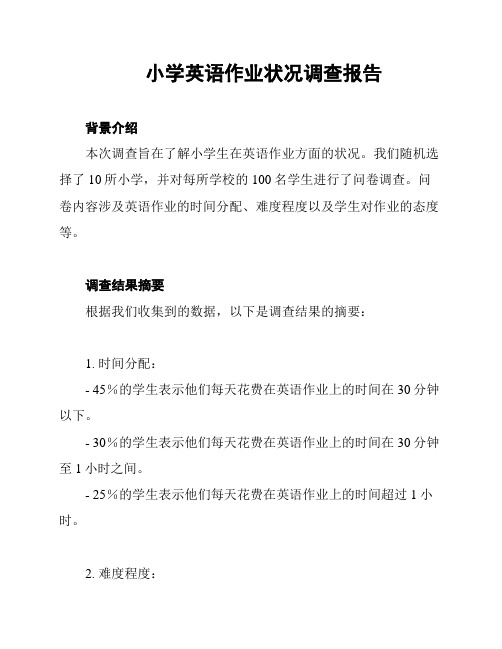
小学英语作业状况调查报告背景介绍本次调查旨在了解小学生在英语作业方面的状况。
我们随机选择了10所小学,并对每所学校的100名学生进行了问卷调查。
问卷内容涉及英语作业的时间分配、难度程度以及学生对作业的态度等。
调查结果摘要根据我们收集到的数据,以下是调查结果的摘要:1. 时间分配:- 45%的学生表示他们每天花费在英语作业上的时间在30分钟以下。
- 30%的学生表示他们每天花费在英语作业上的时间在30分钟至1小时之间。
- 25%的学生表示他们每天花费在英语作业上的时间超过1小时。
2. 难度程度:- 55%的学生认为英语作业的难度适中。
- 30%的学生认为英语作业的难度较容易。
- 15%的学生认为英语作业的难度较困难。
3. 学生态度:- 60%的学生表示他们对英语作业持积极态度。
- 30%的学生表示他们对英语作业持中立态度。
- 10%的学生表示他们对英语作业持消极态度。
结论根据调查结果,大部分小学生每天花费在英语作业上的时间在30分钟至1小时之间,并认为作业的难度适中。
他们对英语作业的态度普遍积极,但也有一部分学生对作业持中立或消极态度。
这些结果对教师和家长提供了一些指导意见,如根据学生的时间分配情况调整作业量,关注那些对作业态度持中立或消极态度的学生,帮助他们养成更好的研究惯。
下一步行动为了更全面地了解小学生的英语作业状况,我们建议进行更深入的调查,包括与学生和教师的面对面访谈,以及观察他们在课堂上的研究状态。
这样可以进一步帮助我们了解学生的研究需求,并提供更具体的建议和解决方案。
致谢我们衷心感谢所有参与调查的学生和学校。
他们的参与使得本调查报告得以完成。
同时也感谢您的阅读和关注!。
小学英语(三年级)分层作业设计调查问卷分析报告

小学英语(三年级)分层作业设计调查问卷分析报告11月25日,为了更准确地了解学生真实的心理想法和作业情况,从而能够发现存在的一些真实的问题,并针对这些实际问题采取相对应的有用的措施,更好地促进我校学生的英语学习状况,我采取了进行调查问卷的方法,调查对象为六年级三班的学生,共发问卷38份,收回38份。
现将调查结果总结如下。
首先对调查问卷中每个题目当中有多少学生选择了该选项做如下统计:此次调查问卷共设置15道题目,题目如下:亲爱的同学:你好!这张问卷能帮助老师更好地了解你对小学英语作业的真实心理想法和作业情况,也有助于老师在今后的教学中改进英语作业的布置与评改,请你一定要认真、如实填写以下问题(答案没有对错之分,部分题可多选,会在题后注明),谢谢你的合作。
1.你喜欢做英语作业吗?()A.喜欢B.一般C.不喜欢分析:选A学生32人,占84%;选B学生6人,占16%。
说明大多数学生对学习英语还是有兴趣,对于完成英语作业还是比较积极。
2.你认为完成英语作业对提高英语成绩有作用吗?()A.有帮助B.一般C.没有帮助分析:选A学生35人,占92% ,选B学生3人,占8%。
说明大多数学生都认为英语作业是对英语学习和提高英语成绩有帮助。
因为完成英语作业可以更好巩固所学的知识。
3.你最喜欢做哪类英语作业?()(可多选)A.简单的抄写等书面作业B.口头的读背作业C.动手操作性作业(如手抄报等)D.练习卷等书面作业分析:此题为多选题,选A学生17人,占45%;选B学生20人,占53%;选C学生24人,占63%;选D学生18人,占47%。
说明大多数学生喜欢完成动手操作性作业,口头作业。
因为这两类作业可以让孩子口语能得到较好的锻炼,动手操作作业可以很好锻炼孩子的思维。
有一部分孩子喜欢做书面作业,到了三年级英语加入了写的作业,尤其是记单词让孩子们感到学英语渐渐有了难度,但从老师的角度分析,必须让孩子们听说读写结合,这样才能把英语学好,小学阶段打好英语基础对以后的英语学习很重要。
小学英语家庭作业情况调查报告范文
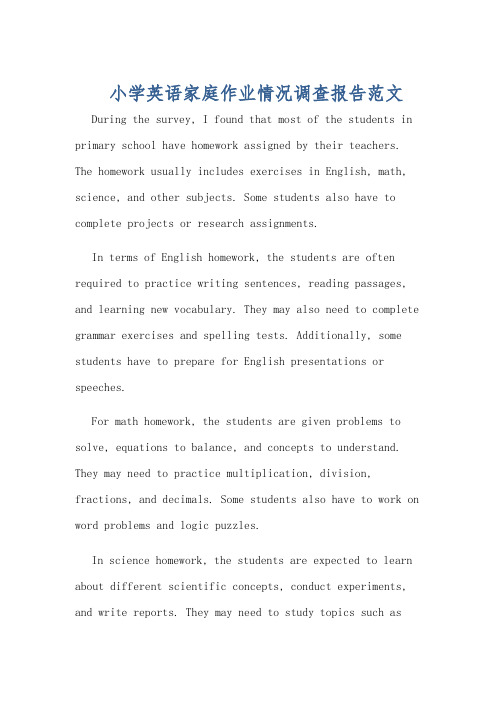
小学英语家庭作业情况调查报告范文During the survey, I found that most of the students in primary school have homework assigned by their teachers. The homework usually includes exercises in English, math, science, and other subjects. Some students also have to complete projects or research assignments.In terms of English homework, the students are often required to practice writing sentences, reading passages, and learning new vocabulary. They may also need to complete grammar exercises and spelling tests. Additionally, some students have to prepare for English presentations or speeches.For math homework, the students are given problems to solve, equations to balance, and concepts to understand. They may need to practice multiplication, division, fractions, and decimals. Some students also have to work on word problems and logic puzzles.In science homework, the students are expected to learn about different scientific concepts, conduct experiments, and write reports. They may need to study topics such asplants, animals, the human body, the solar system, and the environment. Some students also have to create models or diagrams to demonstrate their understanding.Overall, the students seem to be managing their homework well. They are able to complete their assignments on time and ask for help when needed. However, some students find certain subjects more challenging than others and may require extra support from their parents or tutors.在调查中,我发现大多数小学生都有老师布置的家庭作业。
- 1、下载文档前请自行甄别文档内容的完整性,平台不提供额外的编辑、内容补充、找答案等附加服务。
- 2、"仅部分预览"的文档,不可在线预览部分如存在完整性等问题,可反馈申请退款(可完整预览的文档不适用该条件!)。
- 3、如文档侵犯您的权益,请联系客服反馈,我们会尽快为您处理(人工客服工作时间:9:00-18:30)。
小学英语作业的调查报告
调查时间:2016年4月
调查地点:小学
调查对象:3~6年级学生
调查方法:问卷调查法
调查人员:
调查分工:负责以上三项调查
2001年开始,小学英语课程成为我国国家规定的必修课程,小学英语教育正式成为基础教育的基本组成部分,小学英语课外作业是小学英语课堂教与学的延伸和补充,它既是教师教学活动的一个重要环节,又是学生学习过程中的一个重要组成部分。
它旨在开发学生的潜在的学习能力,为学生开创一个将英语应用于生活实际的广阔天空地。
因此,本文对小学英语作业布置的情况作一个分析。
一直以来,我校学生英语课外作业地完成情况不容乐观。
为了使学生能完
成英语课外作业,更有效地掌握英语,提高英语作业地效率,2016年4月中旬我制定了关于小学英语作业的调查问卷,对我校三至六年级学生进行了作业地调查。
具体如下:
一、调查的方式
为了使受调查的学生具有普遍性、客观性,增加调查的可信度,我采用的调查方式是问卷调查形式,以班级为单位,每个班级进行问卷调查,然后从中抽取25名进行问卷调查。
二、调查的内容
本次调查共设计了5道题,包括作业量、完成作业时间、态度、作业批阅与反馈评价以及课外阅读、学生的英语学习兴趣等多方面。
具体题目如下:
1、你觉得孩子英语作业量如何?()
A非常多B.适中
C、较少
2、学校教师对作业每次都自己批改吗?()
A. 每次都坚持批改
B. 偶尔批改
C. 不批改
3、你认为自己的每天的英语作业量多少比较合适?()
A、15分钟左右分钟左右
C、1小时左右
4、你希望的英语作业类型是()
A、抄写为主
B、课外阅读为主
C、听、读为主
5、你喜欢英语学科吗?()
A.喜欢
B.不喜欢
C. 马马虎虎
三、调查数据分析
1、在被调查的家长中,有125人认为英语老师布置的作业量适中,占总数的%,有17人认为我校作业量太少,占总数的%,有人认为我校的英语学科作业量太多,占总数的5%。
三、四年英语作业量比较合适,有部分家长认为作业不是很多,五、六年级英语作业量大部分家长认为比较适中,个别教师英语作
业量较大。
2、通过第二题
可看出认为教师对作业批阅、反馈的有150人,占总数的95%,
3、通过第三题可以看出,认为英语学科作业量在30分钟左右合适的有120人,占总数的80%;30人认为15分钟合适,占总数的21%;
没有人认为作业在1小时左右比较好。
4、通过第四题可以看出,大多数家长反对机械抄写,英语学科作业最好有不同种类,可以是课外英语阅读,可以是听、读、写,也可以是综合性练习。
5、通过第六题可以看出,有145名学生认为自己的对英语感兴趣,占总数的96%,只有5人认为自己的孩子对英语不喜欢,且3人都是五、六年级的,从这一点可以看出,五、六年级已经有部分学生对英语不感兴趣,占五六年级总数的12%,这部分学生现在就对英语不感兴趣,还可以说他们英语学习已经
有了障碍,这对他们初中英语学习是很不利的,所以我校英语学科教学必须从培养学生的英语学习兴趣入手。
四、整改措施
(一)三、四年级
针对三、四年级孩子接触英语时间不长,词汇量和作业形式局限性较大,所以作业的布置主要体现在口语、听力及综合性试题三个方面:
1、听磁带与经常在家早读20分钟。
2、制作单词卡片,贴在家中的醒目位置,不断加强对单词的认识与记忆。
3、经常制作海报或英语知识小报。
4、在班级设置英语角,将全班分为4个组,进行英语口语表达与训练的比赛,每周评出周冠军,每月评出月冠军,一学期评出学期冠军,一年评出年度冠军,在国旗下进行表扬与奖励,激励学生,读懂孩子,走进孩子的内心世界。
(二)五、六年级
五、六年级与三、四年级相比,单词、句型的书写大大增加,学生学习英
语的难度加强,所以我们力求在作业设计时夯实基础,发展学生听说读写的综合语言实践能力。
具体主要体现在以下:1、为了让学生掌握英语基础知识,每天留12分钟的英语书写作业,及时巩固当天
所学的基础知识。
2、每单元出一张试卷,把各单元教材内容与学生实际生活相结合,设计贴近学生生活的拓展性作业,提高学生综合运用能力。
3、经常让学生写一写“老师,我想对你说”,让学生告诉你他最想要什么,他最不想要什么,他有什么学习“心思”、学习障碍等等
总之,一切为了孩子,为了孩子的一切。
这次的调查目的明确,过程清晰,结果令人满意。
从中,我得到了自己想要的东西,知道了学生需要什么,不需要什么,今后的作业的布置方面我将以此为依据,不断改进,争取使我校的学生英语作业做得更好,使我校学生的明
天更辉煌。
